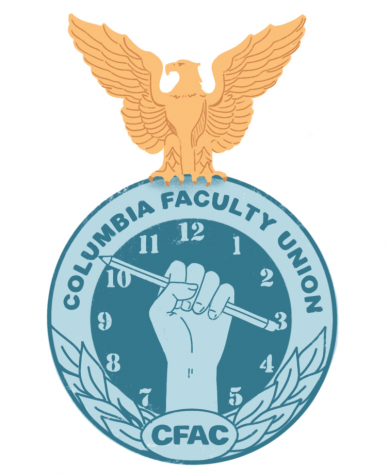Department of Labor to oversee CFAC elections after investigation into complaints
October 11, 2019

Updated 10/11/19 at 9:50 p.m. with additional comments and clarification from CFAC President Diana Vallera
Following two complaints from Columbia part-time faculty members alleging the past two union elections were not conducted properly, the U.S. Department of Labor will oversee the upcoming election.
The DoL investigation found that CFAC failed to hold an officer election at least once in the last three years, according to the Office of Labor-Management Standards.
“[The Office of Labor-Management Standards] determined that the four at-large Steering Committee members contemplated in CFAC’s 2015 Constitution and Bylaws must be elected to the foregoing four offices directly,” the DoL stated in its Voluntary Compliance Agreement with CFAC. “Although the CFAC voluntarily amended its Constitution and Bylaws on August 27, 2019, to provide for the direct election of officers, CFAC denies that its 2017 election cycle violated [federal law].”
Per CFAC’s constitution, elections occur every two years for officer and department representative positions. It was updated in August 2019 along with the vote to affiliate with the Illinois Federation of Teachers, as reported Sept. 9 by the Chronicle.
In past elections, the process began with a call for nominations—members could either nominate someone or self-nominate—and closed on a specified date. The president of the union then formed an election committee, responsible for distributing information about the nominees to all union members who were eligible to vote and counting ballots.
In those past elections, members did not vote directly for those on the union’s Steering Committee, which includes the president, vice president, secretary, treasurer and membership chair positions, said Jason Betke, adjunct professor in the Cinema and Television Art Department. Instead, members would elect departmental representatives, who would then elect the Steering Committee, he said.
In a follow-up email, CFAC President Diana Vallera disputed Betke’s description of the process and said members voted for which nominees they wanted on the Steering Committee, but voters did not choose which nominees would occupy what position.
Adjunct Professor in the Science and Mathematics Department Michele Hoffman, who filed the original complaint to the DoL in fall 2018, alleges she did not receive a ballot to vote in the 2015 and 2017 elections. A second similar complaint to the DoL was from an unnamed union member, but the complaint has been echoed by multiple union members interviewed by the Chronicle.
According to the Sept. 27 union-wide email from CFAC leadership, the DoL “investigated and dismissed the [first] complaint. However, CFAC was forced to spend time and financial resources over a several month period to ensure the complaint was dismissed.”
Hoffman alleges the reason her complaint was dismissed was because she was expelled by the Membership Integrity Committee—making the complaint no longer from a member in good standing—but that her complaint was the main reason she was expelled.
The Integrity Committee is an anonymous group within CFAC that expelled five union members in fall 2018, as reported Dec. 10, 2018, by the Chicago Reader. An Oct. 28, 2018, email sent to Hoffman from the committee regarding the allegations said Hoffman was charged with “taking actions that are causing harm to the union, to union president Diana Vallera and are undermining the bargaining committee during contract negotiations.”
Although Hoffman’s hearing before the Integrity Committee was scheduled for December—which she did not attend because she was not permitted by CFAC to bring legal counsel—she did not receive notice of her expulsion until March 13 when she said, coincidentally, her DoL complaint was still being processed.
“The Department of Labor would not be coming to us if [CFAC] had not violated federal law,” Hoffman said. “The lies have to stop. This is not just because they weren’t voting for specific positions, this is because the DoL found they did not properly hold a vote, period.”
In an Oct. 10 email statement to the Chronicle, the CFAC Steering Committee said it was not made aware of why the DoL dismissed the first complaint, just that it was dismissed.
“[DoL’s] stated concern was with the constitutional provision relating to the [at-large election of] officers,” the Steering Committee wrote in its statement. “The only issue cited was with how the constitution and bylaws were written. We agree the best practice is to vote the officers in directly.”
DoL representatives held a pre-election information session Oct. 7, alongside IFT representatives and CFAC leadership to answer questions from members about the upcoming election. After not receiving a single ballot within the time he has worked part-time at the college since 2013, Adjunct Professor in the Music Department Derek Fawcett said he was reassured of the integrity of the election following the meeting.
“The last email from union leadership downplayed the role of the Department of Labor,” Fawcett said. “This meeting made it clear that this is a pretty complete takeover.”
Chris Johannesson—an adjunct professor and union representative in the Cinema and Television Arts Department—was not happy to see the DoL’s involvement.
“People are trying to sell it like some kind of punishment for two little things that were filed with the Department of Labor,” Johannesson said. “This is the Trump Department of Labor. When you’re talking about them being involved in an election, that little adjective makes a difference because we’re talking about the poster boy for rigging elections.”
Although questions surrounding the two complaints to the DoL were the “two-ton elephant in the room” during the meeting, and there were some moments of tension between the DoL and leadership, Fawcett said the representatives made it very clear that if anything went wrong during the election, the DoL would run a separate election.
In order to create a “foolproof” process, Fawcett said DoL representatives outlined how this election would proceed. He said candidacy nomination notices are tentatively set to open Oct. 21 and close Nov. 4; ballots are expected to be sent out Nov. 18 and the tally is expected to be announced Dec. 9, just in time for the end of the Fall semester.
The election will also be conducted using print ballots to be sent to members’ U.S. post office mailboxes, because while electronic voting may be more efficient, it is not as secure, nor is putting ballots in unguarded faculty mailboxes, Fawcett said.
Johannesson is troubled by the use of print ballots because he sees it as a “serious effort” to suppress voter turnout after “wonderful participation” in the August affiliation vote, which had a 57% participation rate. Likening the print ballot process to “Civil War” times, Johannesson said it will “radically diminish the participation,” whereas previous voting—run through a “vetted” company—has been “absolutely, flawlessly clean.”
Moving forward, Johannesson said he will be hyper-vigilant and that everyone will be “suspiciously” watching the process unfold.
Fawcett said members were told that all official emails sent out by CFAC concerning the election would need to be approved by the DoL first, and that no candidates are permitted to campaign while teaching or during contracted union hours.
Betke said one issue that needs to be addressed is the union not having the correct number of representatives, and members like him said they were never told how many representatives each department is missing.

Under the constitutional changes made during the August IFT vote to comply with federal law, members will vote directly for Steering Committee members.
“In a lot of ways, our union is undemocratic,” Betke said. “Leadership would not be voluntarily letting the DoL supervise if there weren’t legitimate complaints in the past about how the election was managed.”
In the Voluntary Compliance Agreement with the DoL, signed Sept. 26 by Vallera, CFAC agreed to conduct nominations, election and officer installment under the DoL, but the agreement does not admit any violation of federal law by the union.
“The DoL informed us that even though no problematic conduct was found and even though we already remedied the constitution and bylaws, they would like to oversee the upcoming election in order to check off they had some remedy,” the Sept. 27 email from union leadership to members stated. “They asked us to voluntarily agree to allow the DoL to supervise the election committee and the upcoming elections.”
Betke referred to CFAC’s touting of the voluntary nature of the compliance agreement as “baloney,” while Hoffman pointed to the alternative of signing a voluntary compliance agreement—a DoL lawsuit—making the decision seem less voluntary.
Still, Johannesson emphasized the voluntary nature of the agreement and cooperation between CFAC and the DoL. “It’s like vampires,” he said. “You have to invite them in.”
The Sept. 27 email from CFAC said it showed evidence contrary to the two DoL complaints, including affidavits, to demonstrate that all members received emailed election information in 2015 and 2017. CFAC noted that complaints were not filed with CFAC or the DoL between 2015 and 2017 when the elections in question allegedly occurred.
When looking back at emails from 2015 and 2017, Betke found “scant” evidence of election materials and said members are just now beginning to file complaints with the DoL because they want to be sure the 2019 election will be fair. Betke said CFAC leadership is attempting to villainize the DoL and make the department seem like an “intruder.”
“Before going further,” CFAC said in the announcement, “it is important to point out that with a different federal administration, we believe it is unlikely these complaints would have been pursued by the DoL.”
This was in reference to the Trump administration’s tightening of unionization rights.
“That’s lunacy,” Hoffman said, in response to CFAC. “That’s something Trump would say, to be honest.”
According to a memo by the IFT, the complaints to the DoL were unfounded, but the DoL “did find that CFAC’s method of electing officers was not in compliance” with federal labor law, specifically with the at-large voting for the Steering Committee. This was remedied with the August bundled vote for constitutional changes in addition to affiliation with IFT.
“As you can see, CFAC was proactive in amending their constitution prior to the current election cycle,” said IFT spokesperson Monica Trevino in an Oct. 8 email to the Chronicle. “We look forward to a well-run election process, and will assist local 6602 [CFAC] as much [as] possible to make sure all members in good standing have the opportunity to participate.”
For now, many CFAC members are put at ease by the DoL’s presence in this election and are eager to get the campaigning started, but would like leadership to be more straightforward in recognizing the DoL’s role.
“If they’re taking this long, hard look at us … alongside the fact that there is this sense of mistrust and lack of transparency and all these unanswered questions—and all of a sudden things start to look way worse,” Fawcett said. “After this election happens, we all need to be a union together, still. … We need to be a stronger body when we’re done with all of this.”
See the two responses to this story from CFAC members here.







